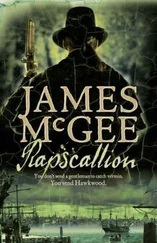James McGee - Ratcatcher
Здесь есть возможность читать онлайн «James McGee - Ratcatcher» — ознакомительный отрывок электронной книги совершенно бесплатно, а после прочтения отрывка купить полную версию. В некоторых случаях можно слушать аудио, скачать через торрент в формате fb2 и присутствует краткое содержание. Жанр: Исторический детектив, на английском языке. Описание произведения, (предисловие) а так же отзывы посетителей доступны на портале библиотеки ЛибКат.
- Название:Ratcatcher
- Автор:
- Жанр:
- Год:неизвестен
- ISBN:нет данных
- Рейтинг книги:4 / 5. Голосов: 1
-
Избранное:Добавить в избранное
- Отзывы:
-
Ваша оценка:
- 80
- 1
- 2
- 3
- 4
- 5
Ratcatcher: краткое содержание, описание и аннотация
Предлагаем к чтению аннотацию, описание, краткое содержание или предисловие (зависит от того, что написал сам автор книги «Ratcatcher»). Если вы не нашли необходимую информацию о книге — напишите в комментариях, мы постараемся отыскать её.
Ratcatcher — читать онлайн ознакомительный отрывок
Ниже представлен текст книги, разбитый по страницам. Система сохранения места последней прочитанной страницы, позволяет с удобством читать онлайн бесплатно книгу «Ratcatcher», без необходимости каждый раз заново искать на чём Вы остановились. Поставьте закладку, и сможете в любой момент перейти на страницу, на которой закончили чтение.
Интервал:
Закладка:
“I was going to say that the man’s half Irish,” Congreve said, without rancour. “So three guesses as to whose navy he planned to destroy first.”
The First Sea Lord, a man clearly unused to someone else holding the floor for any length of time, snorted derisively. Unflustered, Congreve resumed his story.
“He took the idea from an American revolutionary, name of Bushnell. Bushnell built himself a diving boat. Called it the Turtle. The plan was to sail it under Earl Howe’s flagship in New York harbour, attach an explosive device, then withdraw. Fortunately for the admiral, the plan failed. Not enough control of the vessel underwater, plus the flagship’s hull was too tough. But Fulton thought the idea was sound enough to attempt improvements. Turns out Bonaparte thought so too. He financed the vessel’s design and manufacture. Took the bugger three years, used the Seine as a test site. Even gave the thing a name: called it Nautilus.”
“From the Greek,” Blomefield cut in. “Some sort of mollusc, apparently.”
“Indeed,” the colonel observed patiently, before continuing. “Well, by this time we’d begun to pick up reports from our agents in France that Bonaparte’s engineers were conducting experimental underwater explosions. Didn’t think too much of it at the time, but a gradual increase in rumours led us to believe the Frogs were developing a secret weapon, and then Fulton’s name kept cropping up.
“At first we thought it was some kind of sea mine. We’d heard reports of barges being blown up and so forth, but then we heard about something else. A submersible boat. Sounded fantastical, but the rumours persisted. Then we had a stroke of luck.
“We heard the vessel had been tested at sea, but we weren’t able to confirm it until a month or so later, when the captain of a Revenue cutter got into conversation with the master of a brig that had been anchored off the Marcoufs around the same time as the trials were said to have taken place.
“The brig master had a curious tale to tell. Told the Revenue man he’d been chased by a whale! Now, how many whales do you suppose there are in the English Channel, eh?”
Hawkwood didn’t respond. To his ears, the link seemed pretty flimsy, but there was more, as the colonel explained.
Two days previously, one of the brig’s lookouts had observed a small sailboat in trouble; mast and canvas had all but collapsed and the vessel was taking in water. The brig altered course to assist, but by the time they reached the spot, the sailboat had disappeared completely. No wreckage, no bodies, nothing. After searching the area, the brig had resumed course.
“And then something strange happened.” The colonel’s voice was couched low, as if fearful of eavesdroppers. “The brig’s stern lookout spotted what looked like another sailboat in distress! Only this time it was closer in to shore. It was only when the brig master took a look through the glass himself that he recognized it as the same boat! And here’s the rub. He said this time the boat wasn’t sinking, he swore it was rising out of the water!
“It was definitely the same vessel,” Congreve continued. “It was the odd shape of the rig, you see. The master said he’d never seen the like of it before. Said it looked like a half-opened parasol.”
“And the rest,” Blomefield prompted eagerly. “Tell him the rest!”
“Yes, yes.” The colonel waved a hand impatiently. “I’m coming to that. You see, Hawkwood, the brig master estimated the distance between each of the sailboat’s positions to be at least one mile. A mile! It was proof, don’t you see? The Frogs did have a vessel that could sail underwater!”
The colonel checked his excitement. “But what to do? How could we defend ourselves against such a weapon?”
The solution had at first seemed simple. The British government had dispatched an agent to Paris to try and entice Fulton to England.
Thomas Blomefield took up the story.
Fulton had run into trouble with his French allies. A change of administration at the Ministry of Marine had brought with it a sudden reversal of enthusiasm for the American’s invention.
“Decres it was who took over. Looks as if he’s changed his tune since, though, but at the time he thought Fulton’s idea was barbaric, more suited to a pack of corsairs than the Imperial Navy. Put Fulton’s back up, as you can imagine. Fortunately, it coincided with our plan to bring him over to us. Excellent timing on our part. Mind you, he was a greedy bugger!
“Had this agreement with the Frogs. They were to pay him a bounty for every ship destroyed. He demanded a similar contract from us. Also told us if we wanted him to provide details of his submersible and his submarine bombs, it would cost us a hundred thousand pounds for the privilege. Bloody nerve!”
For a moment Hawkwood thought his ears had deceived him. A Runner’s salary was twenty-five shillings a week, plus an extra fourteen shillings for expenses; a little over one hundred pounds a year. A thousand times that was an unimaginable sum. What was it about the American’s invention that made it worth a king’s ransom?
“Anyway,” Blomefield said, “we refused to agree any sort of price until his inventions had been examined and tested in England.”
“In other words,” Congreve put in, “far better to have him inside the tent, pissing out.”
The First Sea Lord and the Admiral smiled weakly. James Read’s expression remained neutral, though Hawkwood thought he detected a faint tremor at the corner of the magistrate’s mouth.
A further inducement had been employed. Fulton had been experimenting with steam as a means of propulsion. While in Paris, he’d written to the Birmingham firm, Boulton amp; Watt, asking them to build an engine for use in a steamboat in the United States. The British Government, not surprisingly, had refused an export permit. However, should Mr Fulton choose to move to England…well, anything was possible.
“Have to confess, I was rather taken with the fellow,” Congreve smiled. “I was on the commission, you see.”
Fulton had travelled to England in April 1804. No sooner had he set foot ashore than Prime Minister Pitt had appointed a special commission to examine the American’s inventions. Other appointees had included the distinguished scientist Henry Cavendish, Admiral Sir Hope Popham, and Sir Joseph Banks, President of the Royal Society. The initial findings, however, had not been well received by Fulton, as the colonel revealed.
“Oh, the design was feasible enough, no doubt about that, but totally impractical in combat.” As he spoke, the colonel’s hand strayed to the sketches on the table. “Or so we thought at the time.” The colonel gave a wry smile. “The commission was more interested in his submarine bomb-his torpedo, as he called it.”
“His what?” Hawkwood asked.
“Torpedo. Named after a breed of fish. The beast uses an electrical discharge to stun its enemies. Not sure how exactly, I’m no expert in aquatic fauna.”
Despite the explanation, Hawkwood felt none the wiser. The colonel might as well have been conversing in Hindustani.
Prime Minister Pitt, however, had been sufficiently impressed to put his signature to a contract agreeing to pay Fulton?40,000 for demonstrating the principles of his submersible and the surrender of all rights to his invention. A very generous amount, even without the additional supplement of?200 a month salary, a credit limit of?7,000 and a further?40,000 for the first French ship destroyed. Admiralty dockyards and arsenals were ordered to furnish materials and equipment as required.
“We tried out his torpedoes at Boulogne later that year,” Congreve said. “Without much success, frankly, but we saw the potential right away. And just the rumour was enough to put the fear of God into the Frogs. There was a lot of refining to do, more testing and so forth. Took another year before we were ready to try again. Remember the Dorothea, Blomefield?”
Читать дальшеИнтервал:
Закладка:
Похожие книги на «Ratcatcher»
Представляем Вашему вниманию похожие книги на «Ratcatcher» списком для выбора. Мы отобрали схожую по названию и смыслу литературу в надежде предоставить читателям больше вариантов отыскать новые, интересные, ещё непрочитанные произведения.
Обсуждение, отзывы о книге «Ratcatcher» и просто собственные мнения читателей. Оставьте ваши комментарии, напишите, что Вы думаете о произведении, его смысле или главных героях. Укажите что конкретно понравилось, а что нет, и почему Вы так считаете.












